|
|
|
Sort Order |
|
|
|
Items / Page
|
|
|
|
|
|
|
| Srl | Item |
| 1 |
ID:
119485


|
|
|
|
|
| Publication |
2013.
|
| Summary/Abstract |
ASEAN's engagement with human rights is characterized by an action-identity gap; member states have created impressive regional commitments while continually violating rights domestically. This gap suggests that member states of ASEAN have used rights for political ends, the enhancement of ASEAN's legitimacy in the eyes of critics, not because they are understood as morally correct. The strategic use of norms indicates that existing recourse to constructivist accounts of norms in ASEAN, currently the dominant explanatory framework, is incorrect. This article argues that an alternative, rational choice, framework for appraising norms within ASEAN offers greater explanatory insight into how and why human rights emerged into ASEAN after 1997. This argument suggests a revised approach to understanding norm violation within ASEAN and through that a more accurate appraisal of the nature of contemporary ASEAN.
|
|
|
|
|
|
|
|
|
|
|
|
|
|
|
|
| 2 |
ID:
157586


|
|
|
|
|
| Summary/Abstract |
This article analyzes the length of interstate wars and the process of reaching a mutually acceptable bargaining solution. Rational choice scholarship has mainly sought to explain long wars in terms of commitment problems and private information. This article complements these rational choice perspectives by arguing that causal beliefs – a variable not considered by previous research – can also prolong wars by increasing expectations of battlefield performance and slowing down information updating. It illustrates the role of religiously based causal beliefs with the case of one of the longest interstate wars of modern time, the Iran–Iraq War of 1980–88. Even though commitment problems were present, they do not identify the root cause of Iran’s high expected utility of continuing the war, as religiously based causal beliefs played a more prominent role in prolonging the war. Religious causal beliefs constitute a real word mechanism that not only creates different priors about expected military capacity, but also slows down the process of updating beliefs, as battlefield events are not seen as credible information. Although the prevalence of religious conflicts has increased over time, the formation of beliefs and their effects on wars remains understudied when applying rational choice to real world conflicts.
|
|
|
|
|
|
|
|
|
|
|
|
|
|
|
|
| 3 |
ID:
101907
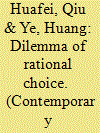

|
|
|
| 4 |
ID:
103181
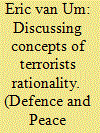

|
|
|
|
|
| Publication |
2011.
|
| Summary/Abstract |
Many researchers on terrorism tend to characterize terrorists as instrumentally rational and politically motivated. Empirically, however, terrorists often seem to deviate from instrumentally rational behavior and to be motivated by other than political reasons. This paper details the explanatory power of various concepts of terrorist rationality incorporating motivations beyond political ones. Results show that none of the concepts discussed accounts for all terrorist actions but all of the concepts are capable of explaining certain aspects of the phenomenon of terrorism. A discussion follows on the appropriateness of specific counterterrorism measures for the concepts of rationality and motivations identified.
|
|
|
|
|
|
|
|
|
|
|
|
|
|
|
|
| 5 |
ID:
131328
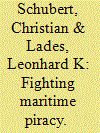

|
|
|
|
|
| Publication |
2014.
|
| Summary/Abstract |
Piracy in international waters is on the rise again, in particular off the coast of Somalia. While the dynamic game between pirates, ship-owners, insurance firms and the military seems to have reached some kind of equilibrium, piracy risks generating significant negative externalities to third parties (e.g. in terms of environmental hazards and terrorism), justifying attempts to contain it. We argue that these attempts may benefit from a look back - through the analytical lens of rational choice theory - to the most successful counterpiracy campaign ever undertaken, namely, the one led by the Roman general Gnaeus Pompeius Magnus (Pompey the Great) in 67 BC.
|
|
|
|
|
|
|
|
|
|
|
|
|
|
|
|
| 6 |
ID:
143535
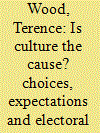

|
|
|
|
|
| Summary/Abstract |
Research on Solomon Islands and Papua New Guinea typically offers one of two explanations for the choices voters make, and the way these choices contribute to those countries’ poor political governance. The first explanation focuses on culture’s influence on the expectations that voters hold of politicians, contending that the Big Man style of local leadership traditionally found in both countries has shaped voter expectations in ways that cause voters to demand local or personal benefits issue_image_89_1_Wood2from MPs rather than good national governance. The second explanation hinges on rational choice models of voter behaviour and does not include culture in its list of explanatory variables. In this paper I argue that neither explanation fits well with key features of these countries’ politics. Drawing on quantitative and qualitative data I show that, while voters are broadly rational and can readily distinguish modern politics from traditional leadership, culture still matters. In particular, informal institutions, associated with the countries’ cultural contexts, influence voter behaviour and electoral collective action, and through this political governance
|
|
|
|
|
|
|
|
|
|
|
|
|
|
|
|
| 7 |
ID:
111583
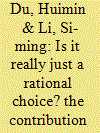

|
|
|
| 8 |
ID:
090201
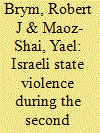

|
|
|
|
|
| Publication |
2009.
|
| Summary/Abstract |
In attempting to explain Israel's retaliatory policies toward Palestinian violence, new institutionalist and rational choice theories vie for dominance. This article argues that both approaches can contribute to understanding the severity of Israel's response if they are viewed as nested explanations appropriate to different threat levels. The article makes its case using data from 74 interviews with senior Israeli counterterrorist experts (2006-07), counts of Israeli and Palestinian fatalities due to state and collective violence (1987-2007), and a database of collective violence events during the Second Intifada (2000-05). Institutional effects are evident at low threat levels, as new institutionalists predict, but these effects are overwhelmed at high threat levels, as rational choice theorists assert.
|
|
|
|
|
|
|
|
|
|
|
|
|
|
|
|
| 9 |
ID:
175620
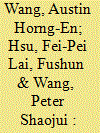

|
|
|
|
|
| Summary/Abstract |
Why do so many voters finance candidates, even out-of-district ones? We exploit two datasets from a candidate in the 2014 Taiwan City Mayor Election derived from 14,838 detail donation records and the candidate’s 296 Facebook posts during the campaign. We replicate previous findings at the district level, indicating that donations are influenced by both physical proximity and ideology. The post-level analysis shows that the neighboring effect does not build as a spillover of public policy or administrative reforms. Instead, residents donate more merely because they are closer to a campaign. Meanwhile, a candidate’s ideological posts can successfully increase donations within a few hours from a district where there are more friendly voters.
|
|
|
|
|
|
|
|
|
|
|
|
|
|
|
|
| 10 |
ID:
087768
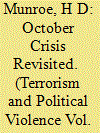

|
|
|
|
|
| Publication |
2009.
|
| Summary/Abstract |
Counterterrorism is generally understood in terrorism research as the product of rational strategic choice by governments. This is rarely the case, however: Strategic choice is often heavily circumscribed by the effects of crisis, when factors become significant drivers of government action. This paper uses the October Crisis of 1970 to demonstrate how the assumption of rational choice can be very misleading, and argues that scholarly research on counterterrorism needs a more nuanced understanding of how a governments' intent is translated into action
|
|
|
|
|
|
|
|
|
|
|
|
|
|
|
|
| 11 |
ID:
078409


|
|
|
|
|
| Summary/Abstract |
How do attachments to political parties among the mass publics of East Asia affect the process of democratization in the region? Analyses of the East Asia Barometer surveys reveal that partisanship motivates East Asians to endorse the democratic performance of their political system and embrace democracy as the best possible system of government. These findings accord, by and large, with the socialization, cognitive dissonance, and rational choice theories of partisanship
|
|
|
|
|
|
|
|
|
|
|
|
|
|
|
|
| 12 |
ID:
102952
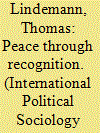

|
|
|
| 13 |
ID:
092511
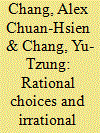

|
|
|
| 14 |
ID:
151401
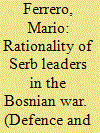

|
|
|
|
|
| Summary/Abstract |
This paper asks whether Bosnian Serb leaders’ choice to carry out a secession war in 1992–1995 was rational from the point of view of their stated goal of ethnic cleansing. We construct two indexes, one of ethnic purity and another of ethnic Serb concentration, and apply them to a counterfactual estimate of the outcome of ‘peaceful’ ethnic cleansing – what could have been achieved by population exchange based on pre-war territorial Serb power without war – in comparison to the actual outcome of the war. We find that the gross benefits of the chosen strategy of secession and war far exceed anything that could be achieved by the peaceful alternative. A conjectural assessment of perceived costs suggests that also net benefits were maximized by the war strategy. The implication for international deterrence policy is that credible judicial prosecution and punishment is the best way to alter the prospective perpetrators’ calculus.
|
|
|
|
|
|
|
|
|
|
|
|
|
|
|
|
| 15 |
ID:
148480
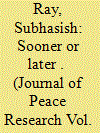

|
|
|
|
|
| Summary/Abstract |
A well-known finding in the literature on ethnic conflict is that new states are more prone to ethnic conflict than old states. What are less well known, however, are the mechanisms through which independence leads to ethnic conflict. This lacuna is surprising since the literature offers different mechanisms to explain the result, each pointing to very distinct policy responses. This article examines these mechanisms by analyzing variations in the time from independence until an ethnic group engaged in armed conflict in ex-British colonies using an original colonial legacies dataset covering 177 ethnic groups in 33 ex-colonies. My analysis reveals that the main group-level triggers of early conflict onset are perceptions of backwardness, exclusion from political power on the eve of independence, downgrading of political status in the immediate aftermath of independence, and being regionally based. More generally, I find that shorter durations of post-independence peace are better explained by subjective evaluations of group worth instead of rational assessments of the costs and benefits of mobilization. These findings indicate that power-sharing arrangements may be a sine qua non for stabilizing new states in divided societies since what is at play in these contexts are complex considerations of group status that cannot be accommodated by non-ethnic institutional arrangements.
|
|
|
|
|
|
|
|
|
|
|
|
|
|
|
|
| 16 |
ID:
145633
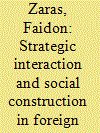

|
|
|
|
|
| Summary/Abstract |
The Helsinki Strategy has provided a popular case for accounts of foreign policy change. However, certain overlooked aspects have allowed for the emergence of an empirical puzzle. The conception and adoption of the Helsinki Strategy as well as the Greek decision not to pursue a joint application to the International Court of Justice (ICJ) for the delimitation of the continental shelf in 2004 is revisited in this study. The latter decision is puzzling to the extent that Greece insisted to include a reference to the ICJ in the Helsinki Summit Conclusions as means of border dispute settlement for European Union (EU) applicants. An explanatory framework which synthesizes rational choice and constructivism and links EU level processes to domestic strategic interactions to explain policy change is constructed and applied to provide a coherent, comprehensive and theoretically valuable account of Greek foreign policy towards Turkey from 1999 to 2004.
|
|
|
|
|
|
|
|
|
|
|
|
|
|
|
|
| 17 |
ID:
090147
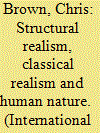

|
|
|
|
|
| Publication |
2009.
|
| Summary/Abstract |
Kenneth Waltz's Theory of International Politics is a modern classic, and deserves to be read the way classic texts ought to be read, i.e. in context and in its own terms. Recovering the context in this case is difficult because of the changes in the discourse since 1979, but one difference between the contemporary and the current reception of the text does seem clear - Waltzian structural realism (or neorealism) is now, but was not then, seen as breaking with the traditions of classical realism. How is this discontinuity to be understood? Part of the answer lies in the rhetoric employed by participants in this debate, but, more substantively, there is a genuine disagreement between neorealism and classical realism over the role played by human nature in international relations. Waltzian neorealism appears, contrary to the tradition, to reject any major role for human nature, describing theories that emphasise this notion as `reductionist'; however, on closer examination, the picture is less clear-cut. Waltz's account of human nature can be related quite closely to the major strands in the realist genealogy, but at a tangent to them. Interestingly, and perhaps unexpectedly, it is also compatible with at least some of the findings of contemporary evolutionary psychology.
|
|
|
|
|
|
|
|
|
|
|
|
|
|
|
|
| 18 |
ID:
142568
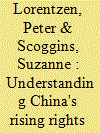

|
|
|
|
|
| Summary/Abstract |
Claims that China's people are exhibiting a rising “rights consciousness” have become commonplace, with some suggesting this phenomenon is driving political change. Yet it is often unclear what the concept means, leading to ambiguous or contradictory conclusions from field research. In order to create a basis for more systematic analysis, we develop a rational choice framework that characterizes three different factors that could lead to rights-conscious behaviour: changing values, changing government policies, and changing expectations of the behaviour of others. What rising rights consciousness implies for social stability can vary dramatically, depending on which change is at work. Rights consciousness resulting from changes in values or in shared expectations of behaviour is destabilizing for the CCP's continued rule, whereas rights consciousness derived from government policies has a stabilizing effect. While in practice these can be interrelated in complex ways, empirical research would benefit from greater attention to these distinctions.
|
|
|
|
|
|
|
|
|
|
|
|
|
|
|
|
| 19 |
ID:
184564
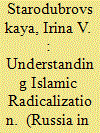

|
|
|
|
|
| Summary/Abstract |
This article addresses two main issues: 1) the research progress in
radicalization theory and its development trends; 2) the relevance of field
research of Islamic communities in the North Caucasus for the radicalization
theory. The author maintains that different conceptions of radicalization,
from simple to more complex and most comprehensive ones, have failed
to cope with the key problems inherent in this approach. One of the main
ways to enrich the radicalization theory is to expand its information basis,
including through field research. The results of field research conducted
in the North Caucasus by the author suggest the need to look closely at
the role of macro processes in understanding radicalization; at religious
radicalism as a “commodity” not only on the religious market, but also on
VOL. 20 • No.1 • JANUARY – MARCH • 2022 185
Irina V. Starodubrovskaya
the market of ideologies and youth cultures; and at competition among
different religious ideologies as a mechanism that can turn mutual relations
between the opponents and proponents of violent actions into a “two-way
street,” and not a “conveyor belt” or “firewall.
|
|
|
|
|
|
|
|
|
|
|
|
|
|
|
|
|
|
|
|
|